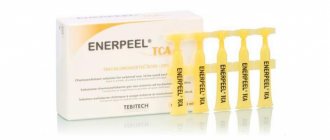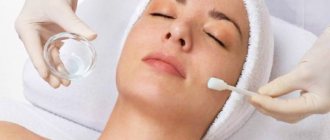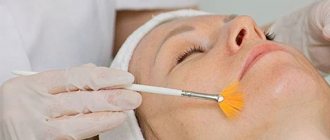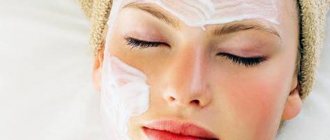Alpika 30 ml
Multi-acid peeling with succinic acid 15% Alpika
The main composition of Alpika peeling products includes fruit and succinic acids. The mechanisms of their action consist in interaction with skin cells, constant catalysis of regenerative processes. Efficiency can be achieved through an intensive increase in the activity of fibroblasts and the natural formation of glycosaminoglycans. Accordingly, the process of formation of your own collagen fibers is restored. Thus, high-quality peeling of dead particles is carried out and the skin whitens.
Tartaric, malic, citric and grape acids combine into a fruit complex, breaking down the created compounds of newly formed scaly particles and dead lifeless cellular tissues. Carefully and gently, the company of acids gets rid of dead cells and actively stimulates the formation of new ones. The fruit complex creates natural protection against unwanted loss of fluid important for skin health, the skin looks well-groomed, acquires excellent turgor properties, and wrinkles and age spots are corrected. Succinic acid contained in the peeling plays the role of a good assistant, having a positive effect on the immune system and retains fluid, initiates the normalization of metabolism in all skin layers. As a result, the healing processes of minor injuries are more intense, and the formation of wrinkles is blocked. Glycolic acid is responsible for the whitening processes of the top layer, as well as the elimination of scaly formations. Active components: acids: tartaric, malic, citric, grape, succinic, glycolic, lactic.
Attention! Multi-acid peeling is designed for professional use. It has a pH of 1.7. There are contraindications. Situations in which the use of peeling is prohibited include mechanical injuries to the upper skin layer, herpes rashes, pregnancy and breastfeeding, several types of telangiectasia, and the use of drugs that increase the photosensitive properties of the skin.
Multi-acid peeling is used for visible symptoms of skin aging, photoaging and in situations of increased activity of the sebaceous glands. Cosmetics containing fruit acids help narrow pore canals, reduce scar formation and stretch marks, acne formations, post-acne and comedones. Directions for use: Pre-clean your face from makeup and other impurities. It is recommended to cleanse using the Bio-Balance cleansing emulsion. For this purpose, apply it to the skin, cleanse the face with massage movements, then rinse with water and wipe the skin with a napkin. After this, apply peeling with a brush with a fan profile. Application rules require adherence to a certain sequence. The nose is covered first, then the chin area. Finish the procedure by applying it to the forehead and cheeks. Multi-acid peeling is applied horizontally, distributing it evenly on the skin. Application must be done in several stages, gradually increasing layers. The depth of penetration of active components directly depends on the number of layers. After applying the peeling, active peeling of the skin and a feeling of tightness will be observed for 3-7 days.
The effect of peeling particles is neutralized with special tonic “Postpeelihg”, and then the skin is intensively washed with water. Then proceed to the next procedure - the use of a restorative mask. Its exposure time is 15-20 minutes. After that, the product is removed with AQUAton fruit water. Then the cleansed skin is wiped with a toner for dry and sensitive skin and covered with sunscreen, which will moisturize the skin and also provide it with an immune filter SPF 32. The full volume includes 5 peeling cleanses every week. Another option is to permanently apply the peel every 3-4 weeks.
Attention! At the end of treatment, a slight tingling sensation or redness may appear. Follow the recommendations and avoid contact with the mucous membrane of the eyes. In case of contact, wash eyes with sufficient amount of water.
Purpose: normalization of the activity of the sebaceous glands, smoothing the skin texture, removing exfoliated cells, cleansing pores, eliminating superficial wrinkles, removing comedones and age spots.
For good health
The substance has many beneficial properties, but it cannot be considered as the only way to treat diseases. Before using the substance, consult your doctor. Research shows that succinic acid:
- suppresses bacterial activity;
- improves digestion;
- activates the function of the pancreas;
- has antioxidant properties;
- increases performance and concentration, is indicated for patients with traumatic brain injury, as it improves oxidative metabolism in brain cells;
- accelerates the process of alcohol processing, so it can be used as a hangover remedy.
Doctors have studied Baltic amber beads used for teething in babies to determine their effectiveness as a pain reliever and disinfectant. The beads were crushed using infrared spectroscopy and dissolved in sulfuric acid to quantify succinic acid. Scientists have not found evidence that succinic acid can enter the body from beads through the skin and mucous membranes. Thus, jewelry and solid pieces of resin cannot have the same properties as the isolated substance.
You can read the continuation of the article by following the link to RBC Style.
What is the effect of such peeling based on?
Multi-acid skin cleansing is a chemical superficial type of peeling, which is most effective for young skin; for more mature skin, medium or deep peels are suitable. The positive effect is based on exfoliation of the stratum corneum of the skin, along with which superficial imperfections also disappear. This type of peeling is one of the most gentle; it does not require compliance with complex rules before the procedure and during the rehabilitation period. It would seem that this should affect the result, but this effect on the skin has the same pronounced effect as other peeling techniques.
The beauty of the multi-acid effect is that it combines the action of several acids, which mutually increase the positive effect of each other. Such a product must contain succinic acid, one of the fruit acids, salicylic acid or hyaluronic acid; the composition is selected individually in each case.
succinic acid
This acid is considered a very popular remedy in the fight for skin beauty, as it has a beneficial effect on cells. As a result of its work, they “wake up” and begin to work more actively, which leads to the normalization of water balance, metabolism and other important processes. The advantage of succinic acid is its versatility: it is suitable for women of any age and for any skin type, including very sensitive ones, which contributes to the growing number of positive reviews about it. It is obtained naturally, without synthesis, and is extracted from amber.
In our body, succinic acid is contained in the form of anions and salts. In the modern world, when the human body is greatly influenced by the environment, bad habits, stress, etc., the content of many substances becomes insufficient for normal functioning. This also applies to succinic acid; its optimal concentration in the body helps maintain energy, normal blood circulation, increase performance, etc. Using it as a basis for the procedure contributes to the following improvements:
- shallow wrinkles are smoothed out;
- reduce the visibility of scars;
- bags under the eyes disappear;
- the skin is whitened, the color is evened out;
- improved blood circulation;
- skin aging slows down.
Fruit acids
As the name suggests, these acids are extracted from fruits; the synthesis method has recently begun to be used; the composition does not differ. By using them as part of a peeling agent, you can achieve the following results:
- improving the protective ability of the epidermis;
- skin hydration;
- activation of collagen synthesis, which helps increase elasticity and smooth out wrinkles;
- enhancing anti-inflammatory and antioxidant effects.
Salicylic acid
This substance is an indispensable assistant for young girls with oily skin. It effectively fights oily shine, enlarged clogged pores, acne and comedones. It has antibacterial, drying, and mild analgesic properties. Its use as a separate product or in combination with other acids ensures effective softening of the stratum corneum of the skin and its gradual removal.
Hyaluronic acid
This acid is found in the connective tissues of humans, plants and animals. It provides the necessary synthesis of collagen and elastin, which support the muscle frame, thereby ensuring skin elasticity. With age, the concentration of acid decreases, therefore, to preserve youthful skin, acid is used as the basis of a peeling agent or fillers.
What is succinic acid used for?
In the human body, succinic acid is found in the form of salts and anions, which are usually called succinates. It is an intermediate product of almost all metabolic reactions. It is these substances that ensure the cell’s absorption of diatomic oxygen, and therefore normalize the breakdown of substances and energy metabolism.
Succinic acid is used in medicine and cosmetology, and is recommended by nutritionists. Some manufacturers enrich their products with this substance. Pharmaceutical products rich in succinates are used by professional athletes to quickly mobilize energy reserves, activate metabolism, and make the body more resilient.
Polina Vladimirova, therapist: “It’s easy to calculate the daily dose. To do this, you need to use the following formula: multiply 0.03 g by your body weight. The resulting figure will be considered the daily norm. It is necessary to take succinic acid only with the permission of the attending physician and in strict compliance with the dosage indicated in the instructions.”
What is succinic acid
Colorless crystals were first mined in the 17th century. The compound is obtained from natural amber, although the acid is found in the human body and in various foods. Thus, it was found in yogurt, sugar beets, rhubarb, sauerkraut, seafood (mainly oysters), rye grains, brewer's yeast, cheese, grapes and unripe gooseberries. The content of this acid in wine usually ranges from 0.5 to 1.5 g/l, but the maximum concentration can reach 3 g/l.
The substance is involved in the production of adenosine triphosphate (ATP), an energy source for biochemical processes. Crystallized into powder, it tastes like citric acid, easily dissolves in water and alcohol, and its melting point is 185 C°.










